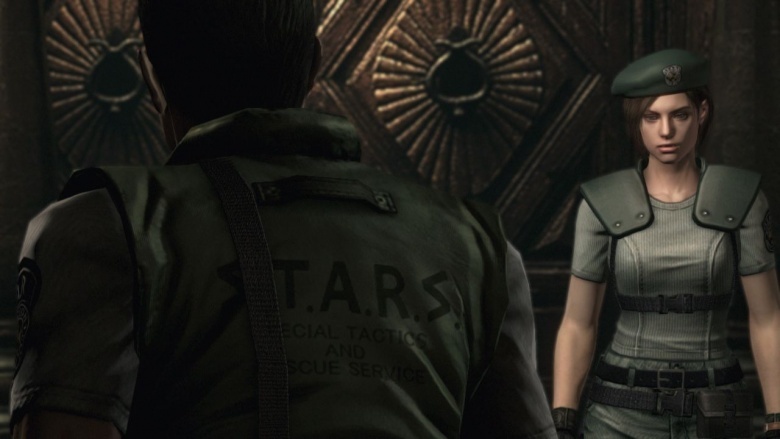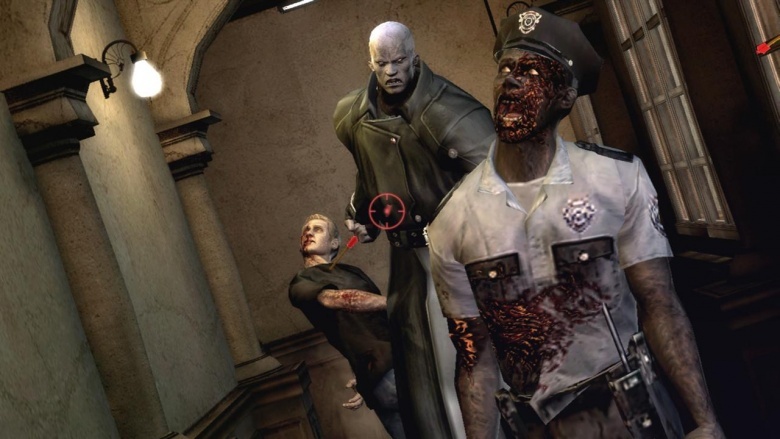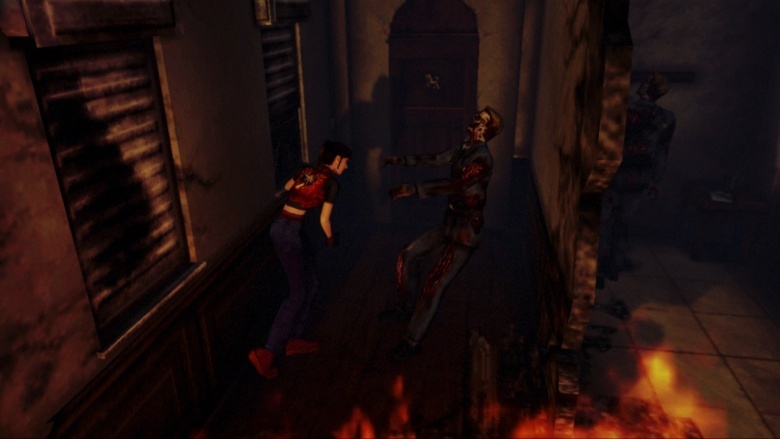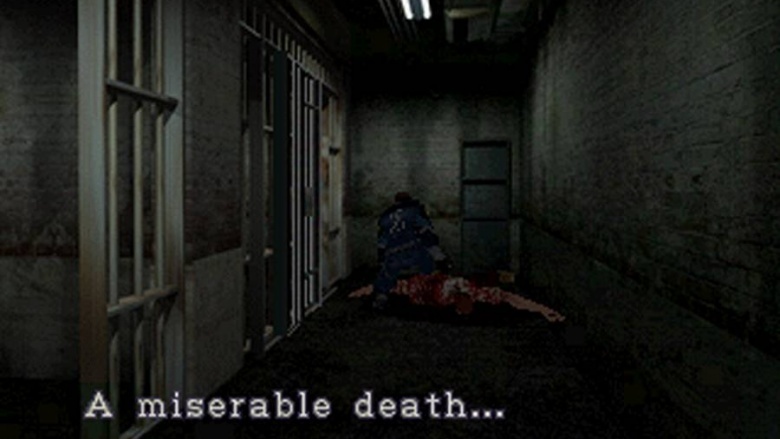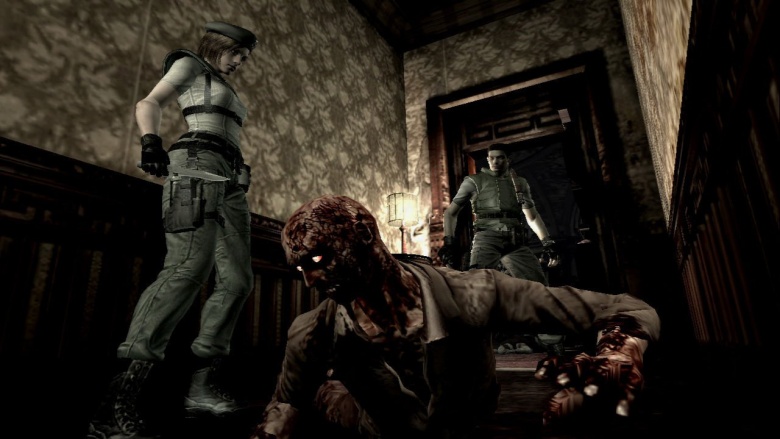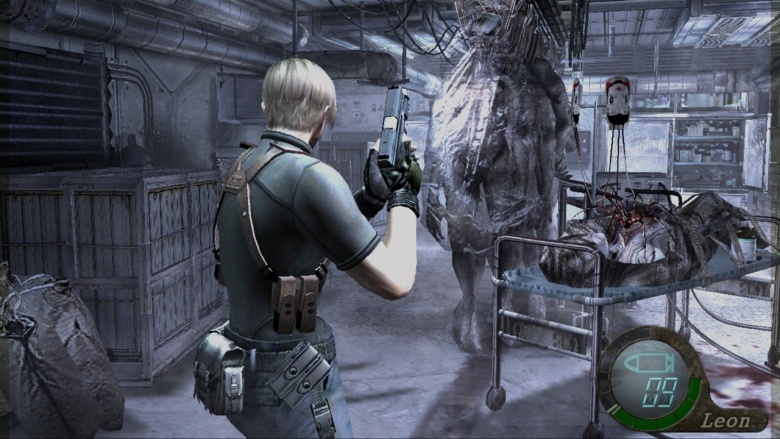Best Resident Evil Games
Weirder than the simple zombie-shooters they're all too often made out to be, Resident Evil/Biohazard games have been widely misunderstood. For this reason, we've decided to set the record straight. With the series' history and tone in mind, here's our ranked list of the top five Resident Evil games.
5. Resident Evil: The Darkside Chronicles
The competition for the fifth slot was close. How in the world did we wind up choosing Darkside Chronicles? The light gun shooter with the shaky cam? What are we thinking? Doesn't Umbrella Chronicles' arcade-style slow-pan camerawork make it more accessible than Darkside Chronicles? Isn't UC's item progression better in literally every way?
Allow us to retort. Essentially an accessible, co-op companion piece to one of gaming's unplayable masterpieces, featuring many of the same locations and plot points, Darkside Chronicles pleased newcomers and veterans alike when it debuted for the Wii. Featuring a robust (though imperfect) weapons system, cinematic presentation, spooky locales, and imaginative scenarios that fill in some of RE 2's many plot holes, Resident Evil:The Darkside Chronicles reinvigorated the franchise with new, exciting gameplay, while retaining a familiar feel. (We appreciated the fan service, Capcom.)
Umbrella Chronicles might have had better item progression, but its trigger-happy, "shoot everything that shines" gameplay killed the atmosphere for us. Let's face it: UC did nothing to innovate. Capcom merely transposed Resident Evil textures onto a run-of-the-mill arcade shooter, in the same way that Zombie Revenge transposed House of the Dead textures onto Fighting Force. In fact, UC's original concept featured RE4-style gameplay. The rail-shooting mechanics and arcade-style gameplay were afterthoughts—and it shows.
Darkside Chronicles captures the atmosphere of paranoia that made RE 2 great. Simply put, it nails the distinctive Resident Evil feeling—if only it had a better upgrade system and fewer QTEs.
4. Resident Evil Code: Veronica
Ah, the Sega Dreamcast—the best mistake Sega ever made. Its failure broke our hearts. In the Dreamcast's heyday, you couldn't find a survival horror game that was better than its exclusive Code: Veronica. Following Claire Redfield on a nonsensical solo adventure and featuring a longer-than-expected compelling campaign, Code: Veronica's close-quarters combat foreshadowed the murder hallways of Dead Space.
Why isn't Code: Veronica higher on the list? Mainly, the mechanics are seriously outdated. (Even the X and X HD updates have failed to bring the game fully current in this regard.) Awkward by any standard, Code: Veronica's stationary camerawork—if you can call it that—and comically imprecise control scheme turn away many newcomers, yet we see its name on lists of must-play Resident Evil games—including this one. Why is that? It's undoubtedly partly nostalgia for its awesome puzzles, but it's also an important game. The linear design, more or less a mainstay of the series ever since, gave the design team more precise control over the action.
3. Resident Evil 2
Resident Evil 2 marks the moment the series showed it wasn't just another House of the Dead retread. RE2's meandering plot line, limited ammo, terrifying scripted events, and variety of deranged enemies make it more than a point-and-shoot zombie shooter. This time around, Leon Kennedy and Claire Redfield end up trapped in Raccoon City, which has been overrun by T-virus-infected monsters. That's right: the first game's outbreak has spread beyond the mansion grounds in this bigger and better sequel.
As Leon and Claire shoot their way through various locations, such as the police station and the underground laboratory, they solve puzzles and learn more shocking truths about the mysterious Umbrella Corporation. (Among such shocking truths: it is an umbrella corporation.) With the same janky camera, tacky dialogue, and clunky gameplay, it's a classic that's desperately in need of a remake. Speak of the devil...
2. Resident Evil HD Remake
Chris Redfield and Jill Valentine's creepy trip through Umbrella Corp's mansion happened a long time ago. Resident Evil was released in 1996. It was so different that gamers could forgive the gameplay's many missteps. The Resident Evil HD Remake corrects the camera and replaces the abysmal controls with multiple schemes, each for a different playstyle. It's by all accounts a modern Resident Evil game, so if you absolutely hate the direction the games have taken since RE4, it probably won't convert you.
The remake captures the spirit of the original game. The HD textures and stylistic remind us that the series isn't—and never was—merely about shooting zombies. Resident Evil's stated influences included Stanley Kubrick's The Shining, the zombie hordes of George Romero, and the 1989 old-school survival horror game Sweet Home, based on the Japanese psychological horror movie of the same name.
This game plays great, but it also shows how wrong we are when we write RE off as a zombie series. Right from the outset, Resident Evil's gross, "New Flesh" aesthetic evoked Western psychological horror cinema. Wriggling, invasive appendages take aesthetic inspiration from Cronenberg as well as modern classic Japanese technothrillers such as Akira, Ghost in the Shell, and Tetsuo The Iron Man. George Romero's endless zombie hordes certainly figured into the equation, but not to the degree that we see in franchises like Dead Rising and Left 4 Dead. We're super-impressed with the so-called REmake. It was a close contender for number one.
1. Resident Evil 4
Resident Evil 4 is the series' high watermark. RE4 is packed with cursed Spanish villagers, unholy monks with tentacles for heads, a smooth-talking sidekick who would be more at home in a Just Cause game, an infestation of invisible bugs in the sewer system, a secret agent who refuses to wear proper PPE in the field, and a combat-trained herbalist with a badge and a gun. It exploits the series' greatest strengths: its surreality, macabre weirdness, and disturbing fetishistic imagery.
RE4 got rid of the top-down camera and pre-rendered environments, finally bringing the franchise's outdated gameplay current. Still, Resident Evil 4 has its detractors; some even wander the halls of Looper HQ. These lost, mistaken souls consider RE4 one of the Resident Evil series' failures—its Red Faction: Armageddon, its Modern Warfare 2; the moment a good thing tanked, only getting worse with RE5 and RE6 with their tacked on superfluous co-op modes and Daikatana-style NPC partners to babysit. Doesn't Capcom know that the babysitting missions are the low points of RE4? Guess not.
RE4 rarely makes sense, but it's a thrilling ride and the best that the series has to offer. The premise is delightfully absurd: the U.S. president's daughter has been kidnapped in Spain so he has sent Leon the cop from Raccoon City to Spain to save her. He couldn't simply notify Spanish authorities? Is the CIA too busy smuggling cocaine? Are no ninja-fighting bad dudes available? "My daughter's been kidnapped. Get that cop from zombie-virus town on the horn!" She's being held in a cursed villa overrun by tool-wielding humanoid monsters. And that's before it goes off the rails with sorcery and a demon-child. Don't mistake our loving mockery; RE4's story is B-movie melodrama worthy of Roger Corman at his finest.
How can the best game in Capcom's premiere zombie-shooting series have no zombies? Zombies have never been the focal point. The series is really about corporate conspiracies, science gone mad, shadowy organizations, unethical medical experiments, and—above all—atmosphere. In that light, RE4 is as good as it gets. We recommend playing it on the Nintendo Wii for the best gameplay experience and on the PC for the best visuals.

